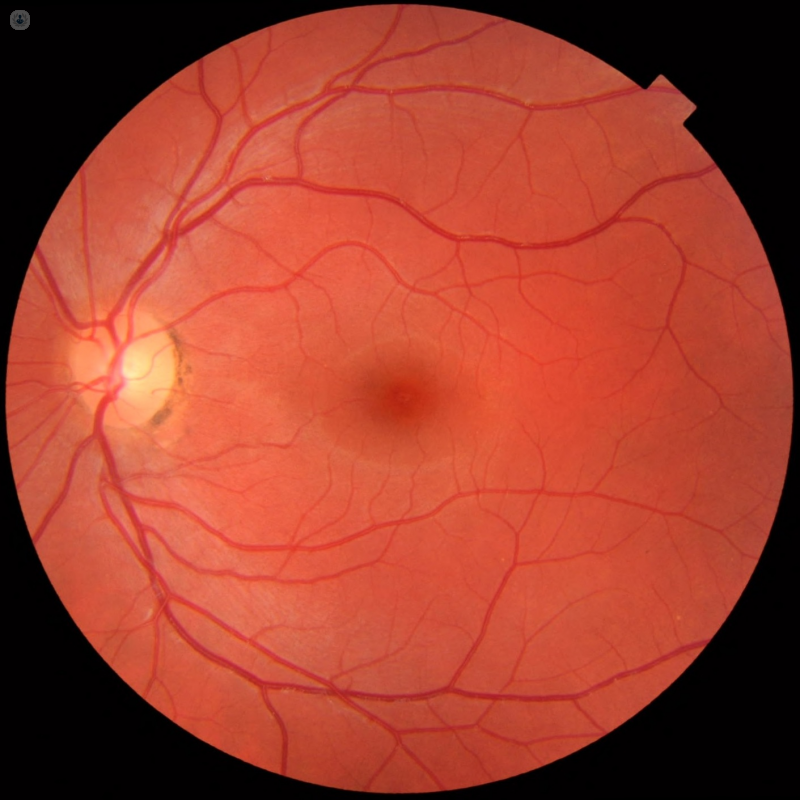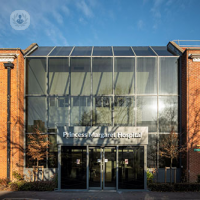What is an epiretinal membrane?
An epiretinal membrane is a translucent cellular membrane that develops over the macula (the central part of the retina responsible for vision of detail and movement). These cells are normally derived from the retina but may also be derived from deeper layers, such as the pigmented epithelium.
These cells secrete collagen and form a mesh; when this membrane contracts, it distorts retinal tissue, giving rise to folds and wrinkles on the surface of the macula that affect its function.
Prognosis
If the epiretinal membrane is not treated, it may lead to loss of central vision; however, it will never lead to total vision loss because only the macula is affected. Hence it is important to undergo annual reviews.
Symptoms of epiretinal membrane
This pathology may be asymptomatic, though the main symptoms that reveal the presence of an epiretinal membrane are loss of visual acuity, distortion of images (metamorphopsia), micropsia (seeing objects smaller), diplopia (seeing double), aniseiconia (seeing objects of different size in each eye) and vision loss.
Medical tests for epiretinal membrane
To confirm metamorphopsia, the Amsler grid test is performed. To diagnose blurred vision, optotypes are used.
What are the causes of epiretinal membrane?
There are different factors that can cause epiretinal membrane, though the most frequent is posterior vitreous detachment (ageing process of the gel inside the eye, usually appearing in people aged over 50 years). Other causes are retinal detachment, vascular diseases, intraocular inflammation and severe ocular traumatic injury.
Can it be prevented?
There are no concrete measures to prevent the development of an epiretinal membrane. Even so, it is important to consult with an ophthalmologist if you suspect any symptoms (such as floaters or flashes).
Treatment of the epiretinal membrane
The epiretinal membrane can be monitored at regular intervals, but if the symptoms worsen, consideration should be given to vitreoretinal surgery (posterior vitrectomy), one of the retinal surgical procedures giving the best results. This technique can restore vision that has been lost since the membrane developed (however normally only about half is restored, so the intervention should not be delayed too much).

Which specialist treats it?
The epiretinal membrane should be treated by an ophthalmologist.
11-13-2012 04-18-2023Epiretinal membrane
Mr Hadi Zambarakji - Ophthalmology
Created on: 11-13-2012
Updated on: 04-18-2023
Edited by: Conor Dunworth
What is an epiretinal membrane?
An epiretinal membrane is a translucent cellular membrane that develops over the macula (the central part of the retina responsible for vision of detail and movement). These cells are normally derived from the retina but may also be derived from deeper layers, such as the pigmented epithelium.
These cells secrete collagen and form a mesh; when this membrane contracts, it distorts retinal tissue, giving rise to folds and wrinkles on the surface of the macula that affect its function.
Prognosis
If the epiretinal membrane is not treated, it may lead to loss of central vision; however, it will never lead to total vision loss because only the macula is affected. Hence it is important to undergo annual reviews.
Symptoms of epiretinal membrane
This pathology may be asymptomatic, though the main symptoms that reveal the presence of an epiretinal membrane are loss of visual acuity, distortion of images (metamorphopsia), micropsia (seeing objects smaller), diplopia (seeing double), aniseiconia (seeing objects of different size in each eye) and vision loss.
Medical tests for epiretinal membrane
To confirm metamorphopsia, the Amsler grid test is performed. To diagnose blurred vision, optotypes are used.
What are the causes of epiretinal membrane?
There are different factors that can cause epiretinal membrane, though the most frequent is posterior vitreous detachment (ageing process of the gel inside the eye, usually appearing in people aged over 50 years). Other causes are retinal detachment, vascular diseases, intraocular inflammation and severe ocular traumatic injury.
Can it be prevented?
There are no concrete measures to prevent the development of an epiretinal membrane. Even so, it is important to consult with an ophthalmologist if you suspect any symptoms (such as floaters or flashes).
Treatment of the epiretinal membrane
The epiretinal membrane can be monitored at regular intervals, but if the symptoms worsen, consideration should be given to vitreoretinal surgery (posterior vitrectomy), one of the retinal surgical procedures giving the best results. This technique can restore vision that has been lost since the membrane developed (however normally only about half is restored, so the intervention should not be delayed too much).

Which specialist treats it?
The epiretinal membrane should be treated by an ophthalmologist.


Epiretinal membrane: causes, symptoms and treatment
By Mr Vaughan Tanner
2024-11-21
If you're experiencing blurred, distorted, and double vision, you may be living with the eye condition epiretinal membrane. We've asked one of our top ophthalmologists Mr Vaughan Tanner to explain the causes, symptoms, risk factors and treatment of ERM. See more


Epiretinal membrane: vitrectomy as treatment
By Mr Alistair Laidlaw
2024-11-21
If you're over the age of 50, you may be at a higher risk of developing epirentinal membranes. We spoke to Mr Alistair Laidlaw, a leading consultant ophthalmologist to find out about treatment options as well as some of the risks, benefitsand potential complications of surgery. See more


Understanding epiretinal membrane: Causes, symptoms, and treatment
By Mr Bhaskar Gupta
2024-11-20
The human eye is a marvel of biological engineering, orchestrating complex processes to capture and interpret the visual world. However, various conditions can impact the delicate structures within the eye, affecting vision and overall ocular health. One such condition is the epiretinal membrane (ERM), a relatively common yet often misunderstood affliction. In his latest online article, Mr Bhaskar Gupta delves into the intricacies of epiretinal membrane, exploring its causes, symptoms, diagnosis, and potential treatment options. See more


Understanding epiretinal membrane: Causes, diagnosis, and surgery
By Mr Craig Goldsmith
2024-11-20
Discover the essentials of epiretinal membrane, also known as macular pucker or vitreomacular traction syndrome. In his latest online article, Mr Craig Goldsmith delves into the causes, highlighting its link to aging and other factors. Learn about the diagnosis process, where eye doctors use drops and scans to assess symptoms impacting vision. See more
Experts in Epiretinal membrane
-
Mr Mahi Muqit
OphthalmologyExpert in:
- Eye floaters
- Epiretinal membrane
- Diabetic retinopathy
- Vitrectomy
- Macular hole
- Retinal detachment
-
Professor James Bainbridge
OphthalmologyExpert in:
- Cataracts
- Epiretinal membrane
- Macular hole
- Retinal detachment
- Eye floaters
- Retinal detachment surgery
-
Mr Jonathan Dowler
OphthalmologyExpert in:
- Intravitreal injection
- Retinal tear
- Epiretinal membrane
- Angiography
- Macular degeneration (AMD)
- Diabetic retinopathy
-
Professor Tom Williamson
OphthalmologyExpert in:
- Retinal detachment
- Macular hole
- Epiretinal membrane
- Diabetic retinopathy
- Cataracts
- Vitrectomy
-
Mr Hadi Zambarakji
OphthalmologyExpert in:
- Retinal detachment
- Macular hole
- Epiretinal membrane
- Macular degeneration (AMD)
- Diabetic retinopathy
- Cataracts
- See all

The Parkside Suite Frimley
The Parkside Suite Frimley
Frimley Park Hospital, Portsmouth Road, GU16 7UJ
No existe teléfono en el centro.
By using the telephone number provided by TOP DOCTORS, you automatically agree to let us use your phone number for statistical and commercial purposes. For further information, read our Privacy Policy
Top Doctors

The Alexandra Hospital - part of Circle Health Group
The Alexandra Hospital - part of Circle Health Group
Mill Ln, Cheadle
No existe teléfono en el centro.
By using the telephone number provided by TOP DOCTORS, you automatically agree to let us use your phone number for statistical and commercial purposes. For further information, read our Privacy Policy
Top Doctors

The Princess Margaret Hospital - part of Circle Health Group
The Princess Margaret Hospital - part of Circle Health Group
Osborne Rd, Windsor SL4 3SJ
No existe teléfono en el centro.
By using the telephone number provided by TOP DOCTORS, you automatically agree to let us use your phone number for statistical and commercial purposes. For further information, read our Privacy Policy
Top Doctors
-
The Parkside Suite Frimley
Frimley Park Hospital, Portsmouth Road, GU16 7UJ, CamberleyExpert in:
- Cardiology
- Orthopaedic surgery
- Breast augmentation
- Dermatology
- Endocrinology
- Gastroenterology
-
The Alexandra Hospital - part of Circle Health Group
Mill Ln, Cheadle, CheadleExpert in:
- Hip
- Cardiology
- Shoulder and elbow
- Paediatrics
- Foot and ankle
- Knee
-
The Princess Margaret Hospital - part of Circle Health Group
Osborne Rd, Windsor SL4 3SJ, WindsorExpert in:
- Brachytherapy
- Cardiology
- General Surgery
- Orthopaedic surgery
- Robotic Surgery
- Dermatology
- See all
- Most viewed diseases, medical tests, and treatments
- Genetic testing
- Minimal access surgery (keyhole surgery)
- Botulinum toxin (Botox™)
- Medicolegal
- Dermal fillers
- Headache
- Strabismus (squint)
- Glaucoma
- Diplopia (double vision)
- Amblyopia







